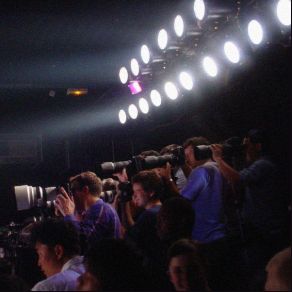Fetch
Download links and information about Fetch by Moritz Von Oswald Trio. This album was released in 2012 and it belongs to Electronica, Techno, Jazz, Dancefloor, Dance Pop genres. It contains 4 tracks with total duration of 50:43 minutes.

|
|
|---|---|
| Artist: | Moritz Von Oswald Trio |
| Release date: | 2012 |
| Genre: | Electronica, Techno, Jazz, Dancefloor, Dance Pop |
| Tracks: | 4 |
| Duration: | 50:43 |
| Buy it NOW at: | |
| Buy on iTunes $9.99 | |
| Buy on Amazon $8.99 | |
Tracks
[Edit]| No. | Title | Length |
|---|---|---|
| 1. | Jam | 17:31 |
| 2. | Dark | 7:06 |
| 3. | Club | 11:56 |
| 4. | Yangissa | 14:10 |
Details
[Edit]The fourth album from Moritz von Oswald Trio in the same number of years, Fetch — like the studio albums Vertical Ascent and Horizontal Structures — consists of four lengthy pieces. This time, arranger, and director von Oswald (string boards, electric piano), Vladislav Delay ("otherworld objects," typically percussive in nature), and Max Loderbauer (synthesizer) are joined by Marc Muellbauer (bass), as well as Jonas Schoen (saxophone, bass clarinet, flute) and Sebastian Studnitzky (trumpet). If you glance at the list of instrumentation and are familiar with the trio's previous work, you might not be stunned that this set stirs up flashbacks to early-'70s Herbie Hancock. In particular, Fetch evokes Crossings and Sextant, the two albums involving electronic music pioneer Patrick Gleeson, as filtered through von Oswald and company's minimal yet open dub-techno base. As usual, the tracks are rooted in improvisation but entail creative editing and mixing to give all of it a sense of fluidity. The 17-minute "Jam" deserves a less plain title. With its echoed splash-bursts of trumpet, it vaguely recalls Miles Davis' Bitches Brew and Eddie Henderson's first two albums, all of which feature some of the personnel on the Hancock recordings. "Dark," one of the trio's dubbier tracks, lurches with as much menace as one of von Oswald's Rhythm & Sound productions. "Club" is the trio's most straightforward track yet, and it also has their most descriptive title; some of its foundational thumps are accentuated with a sound that resembles a clipped, stifled trumpet blurt; its neatly arranged yet clattering percussion somehow complements the rhythm as it casts stark contrast, like essential interjections. "Yangissa" is a rickety yet mechanical shuffle until, around the last third, it stammers and shifts into a nightmarish stomp that dissolves into clusters of percussion and piercing/echoing electronic tones. This borders on sorcery.